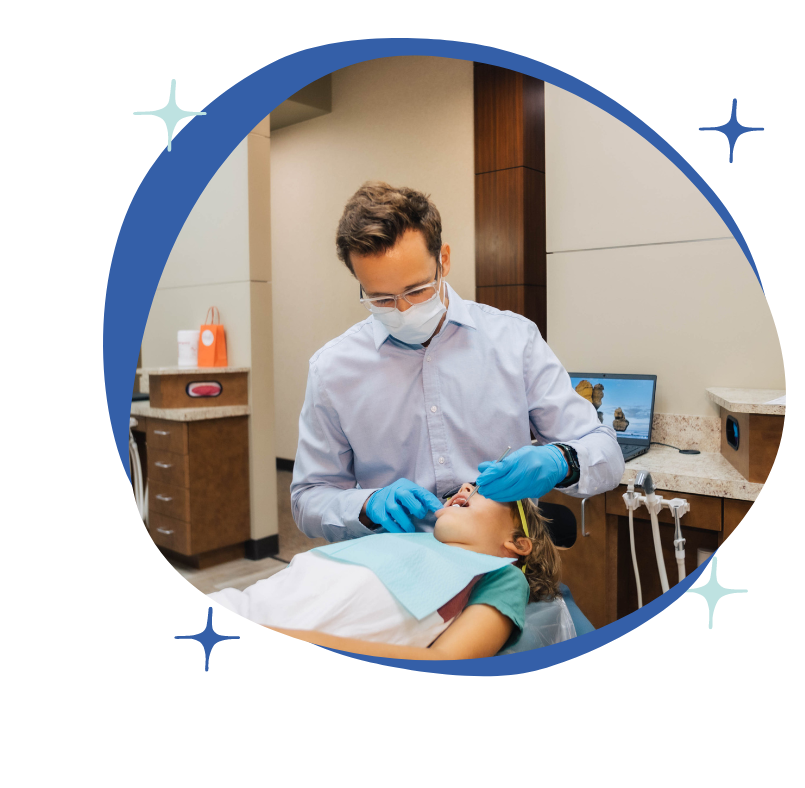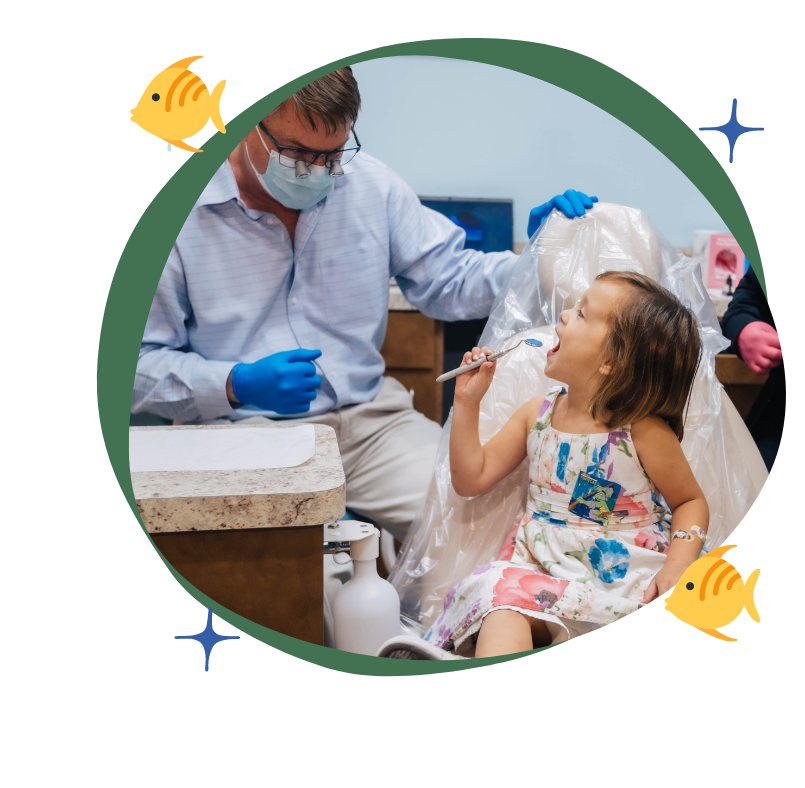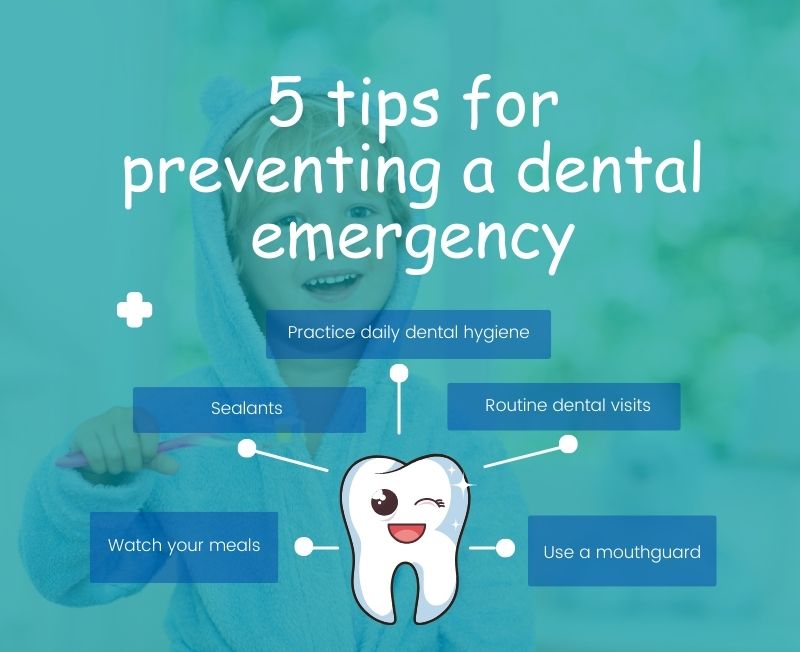VIP Pediatric
Dental Care
Our teeth are incredibly important to our overall health, and they deserve to be treated like VIPs! Regular dental check-ups, brushing, and flossing are just a few of the ways we can ensure that our teeth stay healthy and strong.
For children to give their teeth the care they deserve, we aim to create an enjoyable visit to our dental office. Our dentists and staff at our pediatric dental office make a special effort to create a fun and comfortable environment. We will describe each treatment in a way that your child will understand to ensure that they feel at ease from the moment you all arrive at our office. Their teeth deserve the best care to create long-lasting habits.
American Academy of Pediatric Dentistry Recommendations
Children should visit the dentist by their first birthday. Your child’s newly erupted teeth (erupting at six to 12 months of age) must receive proper dental care and will benefit from good oral hygiene routines from the beginning.

Our Pediatric Dental Services
Our team has specialized training and experience working with toddlers, children and teenagers.
Your Child's Dental Home
Together, let's create an enjoyable dental experience
At KidSmiles, we intend for your child’s dental home to be a place where you, as a parent, feel comfortable and confident in the care your child receives. We make the first visit to the dentist enjoyable and positive for everyone. Please speak with your child about what to expect during their visit to KidSmiles. Our pediatric dental staff will then explain all of the procedures and answer any questions you or your child have when you come into the office.
Pediatric dental offices make it a practice to use words that convey a pleasant and non-frightening message to your child, so we recommend staying away from words like needle, pull, drill, or hurt. Our goal is to help your child build a life-long habit of good oral hygiene. The American Academy of Pediatrics (AAP), American Dental Association (ADA), and American Academy of Pediatric Dentistry (AAPD) all recommend establishing your child’s dental home by their first birthday. Children who have a dental home are more likely to receive appropriate preventive and routine oral care.

Pediatric Dentistry: Helpful Information
At KidSmiles we want to keep your child's smile healthy for life! Although they might not have their primary teeth for long, it is important to practice good oral habits at a young age to prevent issues down the line.
- What Is A Pediatric Dentist?
- Why Primary Teeth Are Important
- Eruption Of Your Child’s Teeth
- Dental Radiographs
- Grinding Teeth At Night
- Is Thumb Sucking Okay?
- What Is Pulp Therapy?
The pediatric dentist has an extra two to three years of specialized training after dental school and is dedicated to children’s oral health from infancy through the teenage years. The very young, pre-teens and teenagers all need different approaches in dealing with their behavior, guiding their dental growth and development, and helping them avoid future dental problems. The pediatric dentist is best qualified to meet these needs.
It is very important to maintain the health of the primary teeth. Neglected cavities can and frequently lead to problems affecting permanent teeth development. Primary teeth, or baby teeth, are important for (1) proper chewing and eating, (2) providing space for the permanent teeth and guiding them into the correct position, and (3) permitting normal development of the jaw bones and muscles. Primary teeth also affect the development of speech and add to an attractive appearance. While the front 4 teeth last until 6-7 years of age, the back teeth (cuspids and molars) aren’t replaced until age 10-13.
Children’s teeth begin forming before birth. As early as 4 months, the first primary (or baby) teeth to erupt through the gums are the lower central incisors, followed closely by the upper central incisors. Although all 20 primary teeth usually appear by age 3, the pace and order of their eruption vary.
Permanent teeth begin appearing around age 6 and at age 8, you can generally expect the upper and bottom 4 primary teeth to be gone and permanent teeth to have taken their place.
Radiographs (X-Rays) are a vital and necessary part of your child’s dental diagnostic process. Without them, certain dental conditions can and will be missed. Radiographs detect much more than cavities. Radiographs allow dentists to diagnose and treat health conditions that cannot be detected during a clinical examination. If dental problems are found and treated early, dental care is more comfortable for your child and more affordable for you. On average, most pediatric dentists request radiographs approximately once a year.
Parents are often concerned about the nocturnal grinding of teeth (bruxism). The majority of cases of pediatric bruxism do not require any treatment. If excessive wear of the teeth (attrition) is present, then a mouth guard (night guard) may be indicated. The good news is most children outgrow bruxism. The grinding decreases between the ages of 6-9, and children tend to stop grinding between ages 9-12. If you suspect bruxism, discuss this with your pediatrician or pediatric dentist.
Thumb sucking that persists beyond the eruption of the permanent teeth can cause problems with the proper growth of the mouth and tooth alignment. Children should cease thumb-sucking by the time their permanent front teeth are ready to erupt. Usually, children stop between the ages of two and four. Pacifiers are no substitute for thumb-sucking as they can affect the teeth essentially the same way as sucking fingers and thumbs. However, pacifier use can be controlled and modified more easily than the thumb or finger habit.
- Children often suck their thumbs when feeling insecure.
- Children who are sucking for comfort will feel less of a need when their parents provide comfort.
- Reward children when they refrain from sucking during difficult periods.
- Your pediatric dentist can encourage children to stop sucking and explain what could happen if they continue.
- Remind the children of their habit by bandaging the thumb or putting a sock on the hand at night.
The pulp of a tooth is the inner, central core of the tooth. The pulp contains nerves, blood vessels, connective tissue, and reparative cells. The purpose of pulp therapy in Pediatric Dentistry is to maintain the vitality of the affected tooth (so the tooth is not lost). A pulpotomy removes the diseased pulp tissue within the crown portion of the tooth. Next, an agent is placed to prevent bacterial growth and calm the remaining nerve tissue. This is followed by a final restoration (usually a stainless steel crown).
Pediatric Dental Emergencies
In the event of an emergency please contact our office immediately or stop by for an evaluation.
Toothache
Clean the area of the affected tooth. Rinse the mouth thoroughly with warm water or use dental floss to dislodge any food that may be impacted. If the pain still exists, contact your child’s dentist. Do not place aspirin or heat on the gum or on the aching tooth. If the face is swollen, apply cold compresses and contact your dentist immediately.
Cut or Bitten Tongue, Lip or Cheek
Apply ice to the injured areas to control swelling. If there is bleeding, apply firm but gentle pressure with a gauze or cloth. If bleeding cannot be controlled by simple pressure, call a doctor or visit the hospital emergency room.
Knocked Out Permanent Tooth
If possible, find the tooth. Handle it by the crown, not by the root. You may rinse the tooth with water only. DO NOT clean with soap, scrub, or handle the tooth unnecessarily. Inspect the tooth for fractures. If it is sound, try to reinsert it in the socket. Have the patient hold the tooth in place by biting on a gauze or clean cloth. If you cannot reinsert the tooth, transport the tooth in a cup containing the patient’s saliva or milk, NOT water. If the patient is old enough, the tooth may also be carried in the patient’s mouth (beside the cheek). The patient must see a dentist IMMEDIATELY! Time is a critical factor in saving the tooth.
Knocked Out Baby Tooth
Contact your pediatric dentist. Unlike with a permanent tooth, the baby tooth should not be replanted due to possible damage to the developing permanent tooth. In most cases, no treatment is necessary.
Chipped/Fractured Permanent Tooth
Time is critical; contact your pediatric dentist immediately to reduce the chance of infection or the need for extensive dental treatment in the future. Rinse the mouth with water and apply a cold compress to reduce swelling. If you can find the broken tooth piece, bring it with you to the dentist.
Chipped/Fractured Baby Tooth: Contact your pediatric dentist.
Severe Blow to the Head: Call 911 immediately or take your child to the nearest hospital emergency room.
Possible Broken or Fractured Jaw: Keep the jaw from moving and take your child to the nearest hospital emergency room.







